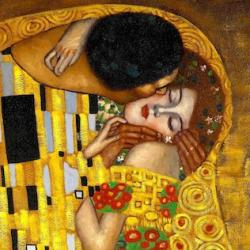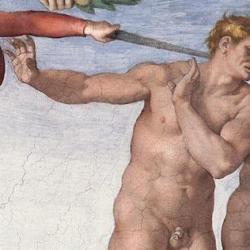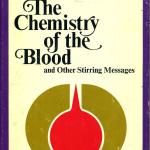Stephen Greenblatt writes in The New Yorker about “How St. Augustine Invented Sex.” How typical of The New Yorker, a cynic might say—interested in the greatest theologian in the Western tradition only because he said something titillating. But it doesn’t take much reading of Augustine to realize that Greenblatt is right to focus his attention here. Augustine’s anxieties and bewilderments about sex were integral to the development of his theology.
Greenblatt covers familiar ground in Augustine’s sexual biography (his father’s embarrassing recognition of the onset of puberty, the passionate love of his mother Monica, Augustine’s sexual adventuring as a young man, his eventual embrace of Lady Continence) but he notes that Augustine’s central contribution was to plumb the early chapters of Genesis for clues to the sexual confusions he recognized in himself and the world around him.
Greenblatt writes, “The archaic story of the naked man and woman, the talking snake, and the magical trees was something of an embarrassment. It was Augustine who rescued it from the decorous oblivion to which it seemed to be heading. He bears principal responsibility for its prominence, including the fact that four in ten Americans today profess to believe in its literal truth. During the more than forty years that succeeded his momentous conversion—years of endless controversy and the wielding of power and feverish writing—he persuaded himself that it was no mere fable or myth. It was the key to everything. He brought to his interpretation not only his philosophical acumen but also memories that reached back decades—to the signs of inquieta adulescentia that made his father babble excitedly to his wife about grandchildren.”
Augustine was puzzled by the involuntary volatility of sexual desire and sexual performance: “Through a sustained reflection on Adam and Eve, Augustine came to understand that what was crucial in his experience was not the budding of sexual maturity but, rather, its unquiet, involuntary character. More than fifty years later, he was still brooding on this fact. Other parts of the body are in our power, if we are healthy, to move or not to move as we wish. ‘But when it must come to man’s great function of the procreation of children,’ he writes, ‘the members which were expressly created for this purpose will not obey the direction of the will, but lust has to be waited for to set these members in motion, as if it had legal right over them.’”
Genesis 1-3 showed that this volatility wasn’t a design feature of sex, but a sign of a global damage: “How weird it is, Augustine thought, that we cannot simply command this crucial part of the body. We become aroused, and the arousal is within us—it is in this sense fully ours—and yet it is not within the executive power of our will. Obviously, the model here is the male body, but he was certain that women must have some equivalent experience, not visible but essentially identical. That is why, in the wake of their transgression, both the first woman and the first man felt shame and covered themselves. . . . Whose body is this, anyway? Where does desire come from? Why am I not in command of my own penis? ‘Sometimes it refuses to act when the mind wills, while often it acts against its will!’”
Sex is good, and the most intense bodily pleasure. Sex is good because it produces children. But Augustine argued, from Genesis, that this desire is “not simply a natural endowment or a divine blessing; it was a touch of evil. What a married man and woman who intend to beget a child do together is not evil, Augustine insisted; it is good. ‘But the action is not performed without evil.’ True, sexual intercourse—as Augustine knew from long experience with his mistress and others—is the greatest bodily pleasure. But the surpassing intensity of pleasure is precisely its dangerous allure, its sweet poison: ‘Surely any friend of wisdom and holy joys . . . would prefer, if possible, to beget children without lust.’”
Our lack of sexual self-control is one of the great existential arguments against Pelagianism. According to Augustine, “we are all marked, in our very origins, with evil. It is not a matter of particular acts of cruelty or violence, specific forms of social pathology, or this or that person who has made a disastrous choice. It is hopelessly shallow and naïve to think, as the Pelagians do, that we begin with a blank slate or that most of us are reasonably decent or that we have it in our power to choose good. There is something deeply, essentially wrong with us.”














